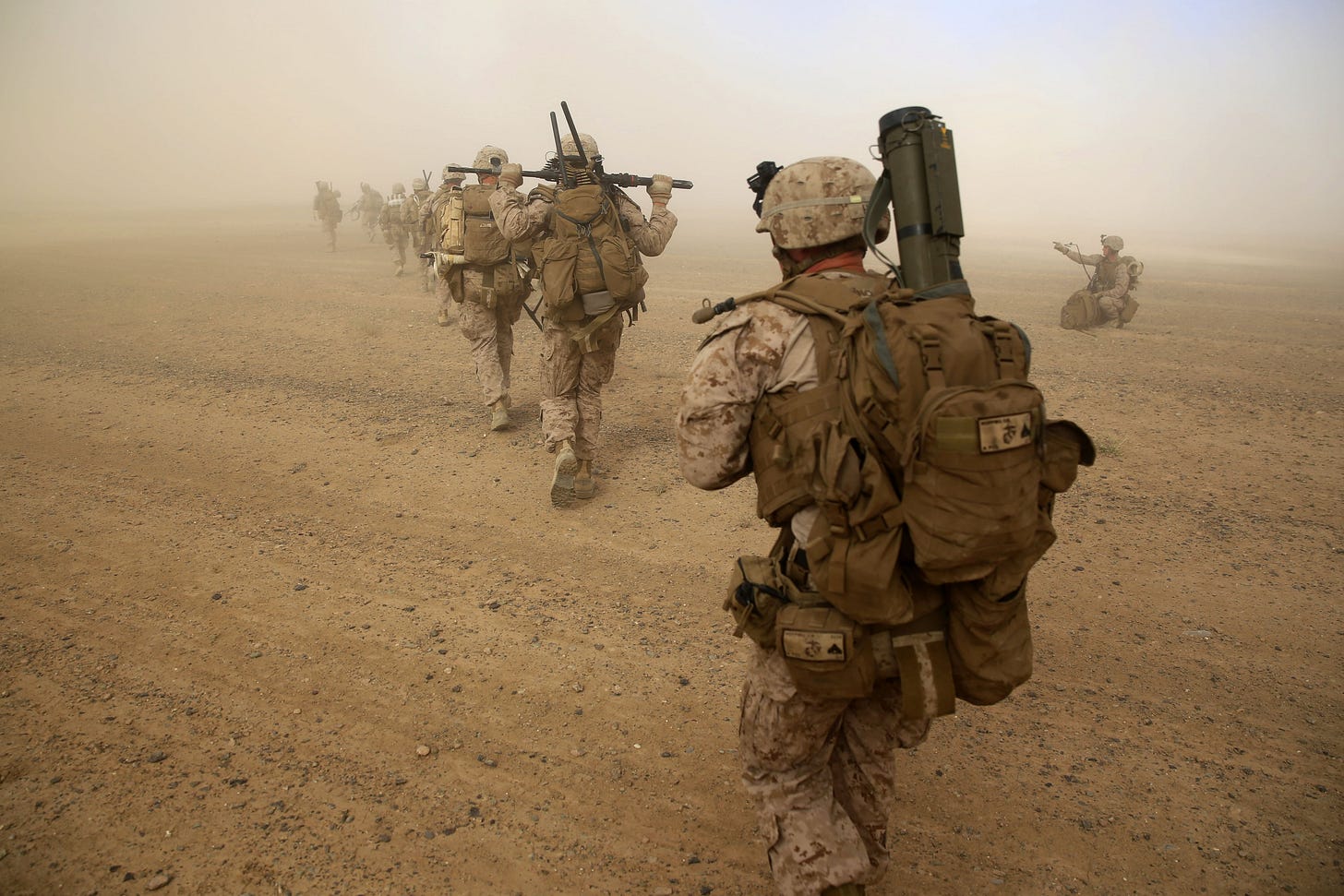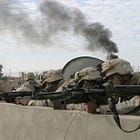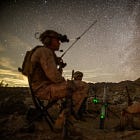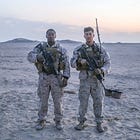Today marks the fourth anniversary since the last American servicemember left Afghanistan. Earlier this week we marked the same milestone for the Abbey Gate attack and the peak of evacuation operations at Kabul’s Hamid Karzai International Airport. For the 2,459 military personnel who gave their lives in that country, it is paramount that we remember their story and their names.
Most importantly, we should commit to learning and training for the sake of their sacrifice.
It is saddening to read how much of a mess our archives of the past twenty years of fighting have become. One example is something many of you have experienced, or personally performed: the smashing of SIPR hard drives post-deployment per SOP.
In the digital age, the mountains of paper that were created following our previous major wars have disappeared and, unfortunately, it has not been replaced with a mountain of data. Instead, it has been deleted.
We’re now looking at a mountain range of learning failures across Iraq, Afghanistan, and Syria. It is important to recognize these failures for what they are. We must be clear eyed about not only our actions since 9/11, but also our inability to properly reflect, evolve, and grow.
But let’s not marvel at it. Let’s act.
Veterans of the past twenty years should view it as their duty to share personal experiences, professional notes, and whatever they can in the pursuit of preparing the next wave of young warriors. Oftentimes, I’ve found, many superb leaders and Marines do not want to share due to their outsized humility. Or, frankly, because it is too difficult for them personally. The latter I understand more than the former, but I would also argue that one can find relief in the process of writing and sharing.
If you ever taught at a professional military school you understand the power and importance of being able to share your personal stories and experiences. It can be a transformative experience for both the instructor and the student. It can also be done terribly and wrapped in ego.
The difference lies between telling a war story (or a CONUS-Friday night-in the barracks story) and imparting a lesson that is useful. A great war story drops jaws, that’s for certain, but does it actually leave the listener better? Or just less confident in their ability to rise to the occasion? Whereas, a great teacher equips the listener with tools that can be used in a myriad of environments and explains how to manipulate them across unique situations. A great lesson includes the how in relation to the context.
I’ll say it again - it is not arrogant to share experience for the purpose of preparing the next generation. You will not be judged because you spoke up. You do have something to give. I reiterate this because I hear these excuses all the time as I ask others to write or come on the podcast. Many, if not all of you, have something to share.
Just imagine if E.B. Sledge never sat at his typewriter. Or Karl Marlantes gave up after a dozen publishers turned him down. Or Philip Caputo kept his shame buried away. We all would be worse off.
If you’re struggling on where to start, I recommend starting small. Tell us about a time:
Training paid off – how did it come together?
A leadership value carried the day
One patrol, or battle, that has stuck with you
A conversation that has continued to linger
One thing you wish you knew then that you know now
If you could tell a new Sergeant or 2ndLt something, what would it be?
Preaching aside, the real reason for this article is to actually act on the sharing of lessons learned. Specifically, on the withdrawal from Kabul. This is a difficult subject to explore for many reasons. It is near impossible to de-tangle the grand strategy from each level of war, the emotions that come with the end of a war - particularly one that ends in failure, and most significantly, the extreme circumstances under which the evacuation took place. Taking away the right lessons is not easy for all of these reasons.
For example, this evacuation was not a clean list of Americans, NATO partners, or protected individuals. It also included a poorly managed program, the Special Issue Visa (SIV) program, at-risk groups such as Afghan Army and Intelligence operatives who were never on the US payroll but were doing important and classified work, as well as civic groups we supported that were at particular risk of Taliban reprisals. This was a sizable portion of the population and planning failed to account for these cohorts.
We’re also running the risk of not learning any lessons. To my knowledge, as a participant and company commander at the Abbey Gate, the Marine Corps has never led a formal AAR process of the lessons learned, though we claimed we did. If I am incorrect, I hope someone directs me to the documents. However, I believe we missed an opportunity to provide valuable updates to both doctrine and our training and educational commands.
What did occur were two investigations, centered around the bombing at Abbey Gate led by Army Central Command (ARCENT). Both the original investigation, and the Supplemental Review can be found at CENTCOM’s FOIA Library by searching “Abbey Gate.” The initial investigation examines the withdrawal broadly and includes interviews with every company sized element who served in the evacuation, their leadership, as well as many members of the Joint Operations Center. This includes a detailed list of recommendations, a thorough timeline, and informative graphics. An hour-long press briefing by the team is also worthwhile and can be located here. The Supplemental Review, completed a year later, closely examines small unit actions, leadership, and decision making at the Abbey Gate. There is much to take away from both.
To hear directly from those on the ground, our good friend, an award-winning publisher and podcaster, Damien O’Connell, has consistently put out incredible discussions as part of the Voices of HKIA Series. If you peruse his Apple Podcast library (also available on Spotify), you will find the personal testaments of squad leaders, platoon and company commanders, and battalion staff. These recordings are full of invaluable lessons to be learned.
Damien also publishes The Maneuverist, the home to the Warfighting Society, an excellent source of PME for small unit leaders. Two of their articles stand out on this matter:
Mitchell Teefey’s “Three Lessons from the Gate: A Platoon Commander’s Take on the Kabul NEO,” which covers NEO training, discipline, and commanders being ready for the fight.
Mitchell also shared additional lessons learned and recommendations for the Marine Corps in “Redefining MEU Workups: Training for the Probable, Not Just the Possible” in the CxFile this summer. Both his articles are worth your time.
Gunner Bill Callan published an excellent analysis of non-lethal weapons (NLW) in “On the Need for Intermediate Force: Operational Lessons From the Afghanistan Evacuation.” He identifies not only a gap in Intermediate Force capability (NLW) in Kabul, but also provides actionable recommendations for the future fight in the Pacific. PP&O should take note.
Finally, I had the chance to join Aaron MacLean’s School of War Podcast this past week to talk about the Marines of Ghost 2/1, the importance of TBS and IOC, how we built a company based on trust, working with the Taliban, and the aftermath of the attack on our position.
The point of all of this is inseparable from the mission of the Connecting File – if we don’t learn we will fail. If we fail, we will lose Marines needlessly. Let’s work together towards winning the next war, now.
Major Geoff Ball is the co-founder of the Connecting File, an infantry officer, and responsible for the grammatical errors found within these pages. He can be reached at cxfile0302@gmail.com.









I have learned a great deal about earlier conflicts from the student War College papers written by WW2 veterans after the war, and similarly from articles, etc. left by veterans of previous conflicts via the earlier iterations of publications from The Infantry Journal and other branch publications. I hope you get a big response to this effort re this century's wars.
I could think of about five bazillion things from OIF/OEF that need to be remembered at the squad/platoon level. Although I read several of H. John Poole’s books early on in my career, he needs to be a household name in the 03XX community.